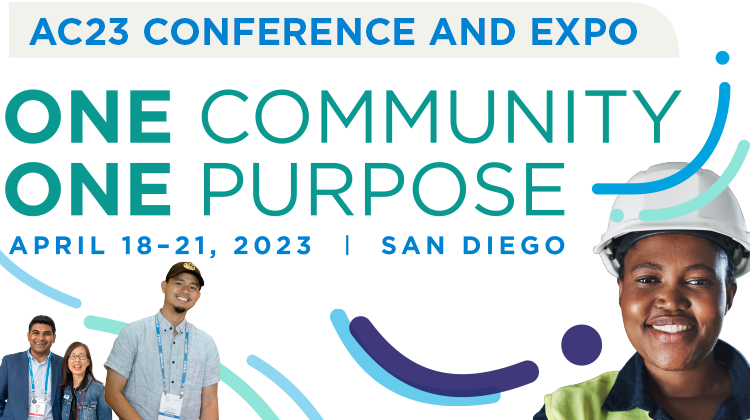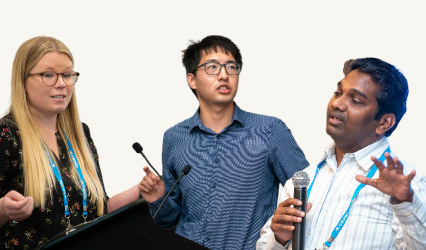
The AC23 Education Program Committee is currently accepting presentation proposals for the upcoming Annual Conference & Expo on April 18-21, 2023, in San Diego. This is a valuable opportunity to share your knowledge and expertise.
This year’s conference theme is One Community. One Purpose. The focus is on intentionality, uniting the wastewater community, and collaborating for a greater calling.
Presentations from an experienced presenter and a first-time presenter, as well as from different disciplines, are highly preferred by the AC23 Education Program Committee.
CWEA also believes that outcome-centered learning is the best way to support Annual Conference participants, as they gain the knowledge and skills they need to do their work. Therefore, we ask presenters design their technical sessions with engagement and practice in mind.
Speakers whose proposals are accepted will receive a list of engagement activities appropriate to your topic that allow participants to apply knowledge and connect with each other.
Presentation proposals are due by September 20 at 11:59 p.m. Submissions will not be accepted after the deadline. Please adhere to the proposal requirements below to be considered by the AC23 Education Program Committee. All speakers must complete their profile tasks for the presentation proposal to be considered complete.
CWEA will provide a virtual opportunity to accepted presenters to learn about effective session design in February 2023, prior to developing conference presentations.
Deadline: September 20th at 11:59 p.m.
 SESSION FORMAT
SESSION FORMATNEW for AC23: session lengths are 30 or 60 minutes.
There is no limit to the number of presentation proposals that may be submitted by an individual, company, or organization. However, you must submit one proposal at a time using the online form.
In the proposal form, please indicate if your presentation will be 30 or 60 minutes, which can include time for discussion and questions. A 60-minute session is strongly preferred and will qualify for 1.2 CWEA contact hours in a specific practice area, depending on the topic. If you opt for a 30-minute session, the committee will consolidate it with a related topic that is also 30 minutes in length to fill a 60-minute time slot. Please also consider inviting a speaker(s) from another organization or company to fill a 60-minute session, including time for discussion and questions.
Proposals submitted by the due date will become the property of the CWEA AC23 Education Program Committee and will not be returned. Proprietary or confidential information included in proposals must be conspicuously stated.
The Education Committee will consider the educational value of each proposal, the expertise of the speakers, the speaker’s ability to engage an audience, and the speaker’s past conference evaluation results (if any). Preference will be given to presentation proposals aligned with the hot topic areas.
Additional considerations used to evaluate proposals:
CWEA is a not-for-profit association. To keep registration costs affordable, CWEA is unable to reimburse speaker travel expenses or pay honorariums. Speakers can register/pay to attend for one day or the full conference at a slightly discounted rate (to be determined).
The success of our conference depends on the efforts of CWEA volunteers. Your interest and commitment as a speaker are greatly appreciated. If the proposal is accepted by the Education Program Committee, speakers will be required to sign a CWEA speaker agreement and complete tasks in the Cadmium platform this fall.